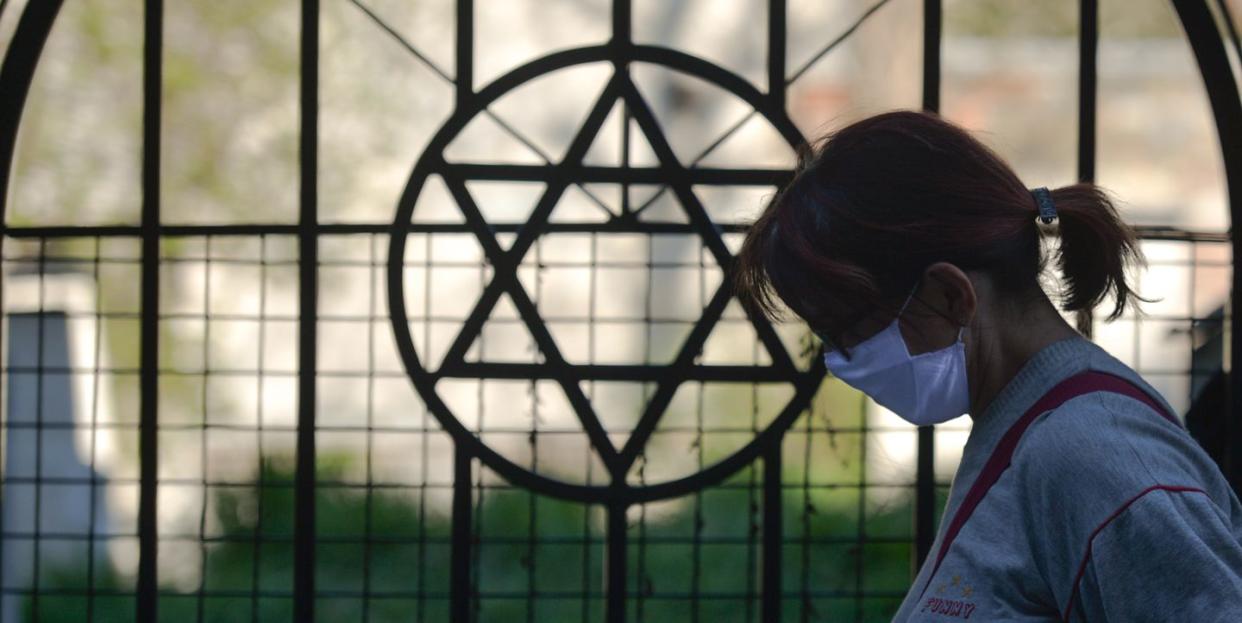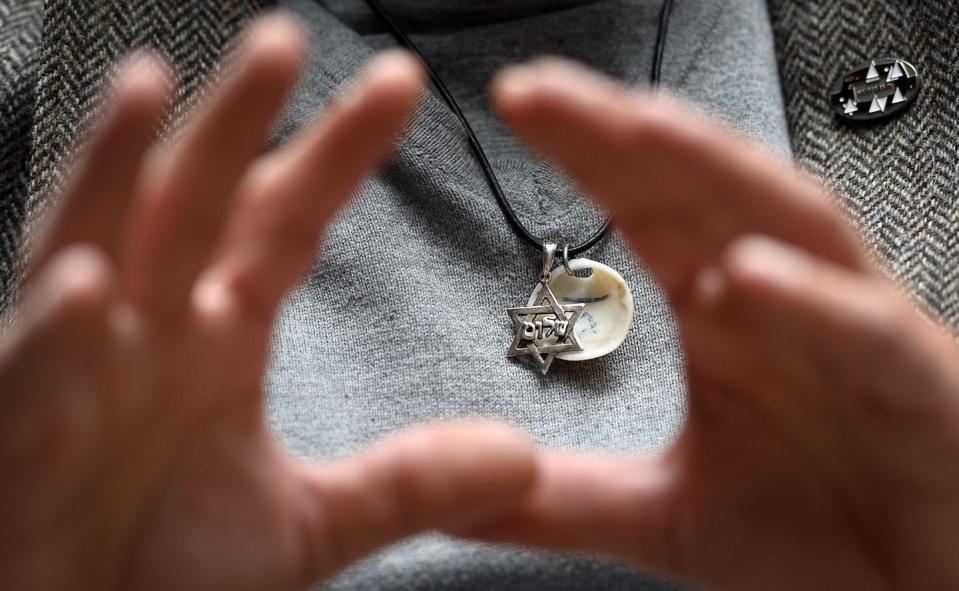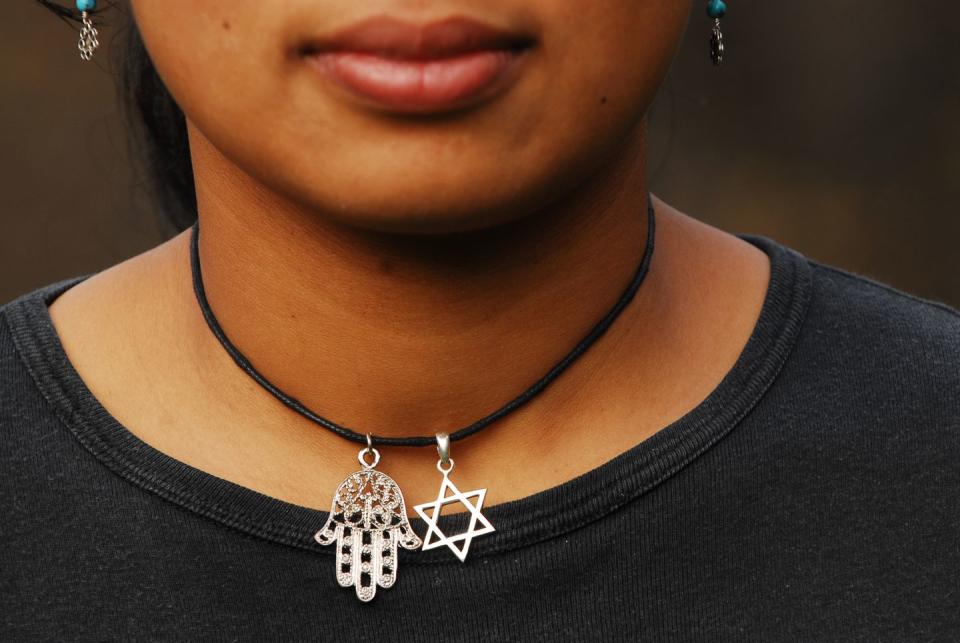Three Jewish Women On Their Experiences Of Antisemitism

We'd hedge our bets that most ELLE readers couldn't imagine being hostile to someone based on the colour of their skin, where they were born, the faith they were raised in, their gender or their sexuality. And if you are, kindly go read some other magazine please.
But sadly - in a similar, and depressing, vein as prejudice towards those of BAME backgrounds and members of the LGBTQ+ community - antisemitic feeling is alive and pervasive in current culture.
Figures released by Community Security Trust, a charity that protects Jews from antisemitism, last year showed the UK experienced its highest ever number of reported online antisemitic incidents between January and June in 2020, as racists had seemingly moved online during lockdown. Spikes in antisemitism were linked to major news events such as Holocaust memorial day and Labour-related antisemitism.
Last July, the world watched in horror as rapper and producer Wiley let forth a deluge of antisemitic comments on social media, including a statement that likened Jews to the Ku Klux Klan.

While some of the musician’s tweets were deleted and his account was temporarily suspended, countless Twitter and Instagram users launched a 48-hour boycott, using the hashtag #NoSafePlaceForJewHate, protesting the platform's seeming lack of affirmative action on the antisemitic tirade. Twitter later banned Wiley's account permanently and apologised for not moving faster to address his comments.
On May 19, 2021 Prime Minister Boris Johnson said the government would support the UK's Jewish community following another spike in antisemitic incidents following the outbreak of hostilities in Gaza in recent weeks. Reuters reports the CST said it had recorded 106 anti-Semitic incidents since May 8, compared to 19 in the 11 previous days - a fivefold increase.
The latest news serves as a stark reminder of the prevalence of antisemitism and the need for solidarity and allyship with the Jewish community. In much the same way as we've seen happening with the Black Lives Matter movement in recent years, the eradication of prejudice starts with recognising, questioning and fighting it as a collective. But in order to combat antisemitism, it’s imperative we learn about it, in all its forms, and understand how it feels to confront it on a daily basis.
I'm still working out my take on the 48h Twitter walk out & the effectiveness of this campaign for #NoSafePlaceForJewHate but one things for sure...If it's just Jews who participate it's pointless. We need allies to join us pic.twitter.com/AggThykJrV
— Richard Daniels 🟣 (@ccdaniels65) July 26, 2020
We spoke to several Jewish women in the UK to find out more about their experiences of antisemitism and how they think it can be fought:
Judaism has played a very important role in my life – it’s a way of life. It’s my faith, my identity and fundamentally who I am.
The first time I learned about the Holocaust was around the age of nine when I read Judith Kerr’s When Hitler Stole Pink Rabbit. In my teens, I recall that a few boys in my friendship group spoke about being called names on the street for wear a kippah. That’s when I began to understand that antisemitism isn't something that happened in the past or is an abstract point of view – it has real consequences.
At work, antisemitism has, unfortunately, become commonplace. I run an organisation which educates people about the Holocaust, so I'm exposed to and have spoken against it for many years.

I once received a call from a radio station about a topic and when I said I was unable to comment the producer told me ‘you lot surely have a view’. I remember putting the phone down and feeling uncomfortable – I knew the ‘you lot’ wasn’t referring to the Holocaust Education Trust.
While the Trust isn’t specifically a Jewish organisation, we don’t have any signage around our office that makes us, or our work, overly visible. Post must be delivered elsewhere before it is sent to our office – I’ve been trained in how to open post that might contain sharp objects. I’m so used to antisemitism on social media – it's all been par for the course of being Jewish for so long. I’m pretty resilient and have learned how to laugh off ignorant people, so it’s rare for their comments to bother me.
Social media has opened up an avenue for people who previously never felt validated to have a voice and be listened to. However, it’s important to recognise that social media doesn’t represent all of society. Generally, British people are good, decent people who are not racists. What we do need is for social media platforms to have tighter regulation and for people running them to recognise their responsibility for what’s published on their sites and of what counts as incitement of hatred, be it against any minority group.
The fight against racism and prejudice is all of our fights – it’s not one community’s. Allyship and working together is key to defeating hate.
Growing up, I wasn't hugely religious but my family is traditional – I’ve had a bat mitzvah, we have weekly Friday night dinners, but I don’t go to synagogue. I’m proud of being Jewish, not so much because of the religion but more as a result of the faith’s history and united suffering.
I’ve never experienced someone telling me they hate me because of my faith, but I’ve definitely faced lesser forms of antisemitism. Unfortunately, antisemitism has become normalised in our society – it doesn’t shock in the same way offensive or prejudiced comments levelled against other minority groups might do.
Following my acid attack in Zanzibar in August 2013, I was regularly asked whether my attackers knew I was Jewish, as if that might have been a reason for the attack. At work, I’ve often heard jokes made about Jewish people being good with money or comments about our appearance. I’ve received countless offensive comments from strangers on YouTube calling me a ‘stupid Jew’ and people automatically expecting me to have an opinion on the Israel-Palestine conflict. The assumptions about Jews are endless.

I do my best not to let antisemitic comments or microaggressions go, but it can be difficult to speak out against them. Whether it’s in a work context or with a friend, you have to be careful when using the word ‘antisemitic’ because it carries so much weight. Unfortunately, Jewish people have learnt to accept stereotypes for fear of other people’s reactions if they were to respond.
People know antisemitism exists it seems like many don’t care. There’s a misconception that Jewish people are privileged and that antisemitism was eradicated after the Holocaust, which couldn’t be further from the truth. As we’ve seen with Wiley, we’re in danger of history repeating itself, to some extent, with people behind social media mistaking hate speech for free speech.
It’s up to everyone, not just Jewish people, to take a stand against antisemitism. Similar to the Black Lives Matter movement, if it’s only one community of people sharing content online about prejudice, we won’t get anywhere.
I am a practising Jew, but was brought up in a non-traditional Jewish home. Judaism is an ethnoreligion, which is as much about the religion as it is about being part of an ethnicity. Being Jewish is a big part of who I am and shapes my views and behaviours.
As one of the only Jews in my school and college, I noticed the prevalence of Holocaust jokes. My grandad was Polish and my grandma is German and they escaped Nazi Germany. I don’t have any extended family because they were killed in the Holocaust. Hearing people make a joke out of it or think it’s funny is hard. You feel totally powerless, upset and angry but often fear drawing more attention to yourself by speaking out. As a child, my father taught me to deflect antisemitism and rise above it. Over the years, this has become harder to do because of the smaller yet more nuanced forms of antisemitism I've faced.

I've lost count of the amount of times I’ve had someone tell me ‘you look Jewish’ and I once told my mum I wanted a nose job which, fortunately, I never had. I once dyed my hair blonder as I thought my natural, curly dark hair made me look more Jewish. As a teenager, who is already insecure about looks, I’m not sure people realise how offensive such comments can be. Fortunately over time and with the support of family and friends I've learned to embrace who I am. I increasingly feel more comfortable calling someone out for being offensive.
That said, it’s often hard to speak out in defence of your faith. A very good friend recently told me she wouldn’t apply to a job because it was a Rothschild & Co business as she’d heard its founders controlled the world. Her comment made me realise how embedded antisemitism is in our society and that much of it comes from a place of ignorance, not malice. I had the courage to flag the offence her comment caused to her and explain it was a dangerous antisemitic trope.
A lot of the issues with antisemitism stem from people not knowing Jews. At university, I was often told I was the first Jew a person had met in their life. People need to talk to their Jewish friends, ask Jewish people how to be better allies and continue sharing content on social media about antisemitism, in all its forms, in order to eradicate antisemitism for good.
Like this article? Sign up to our newsletter to get more articles like this delivered straight to your inbox.
In need of more inspiration, thoughtful journalism and at-home beauty tips? Subscribe to ELLE's print magazine now and pay just £6 for 6 issues. SUBSCRIBE HERE
You Might Also Like


